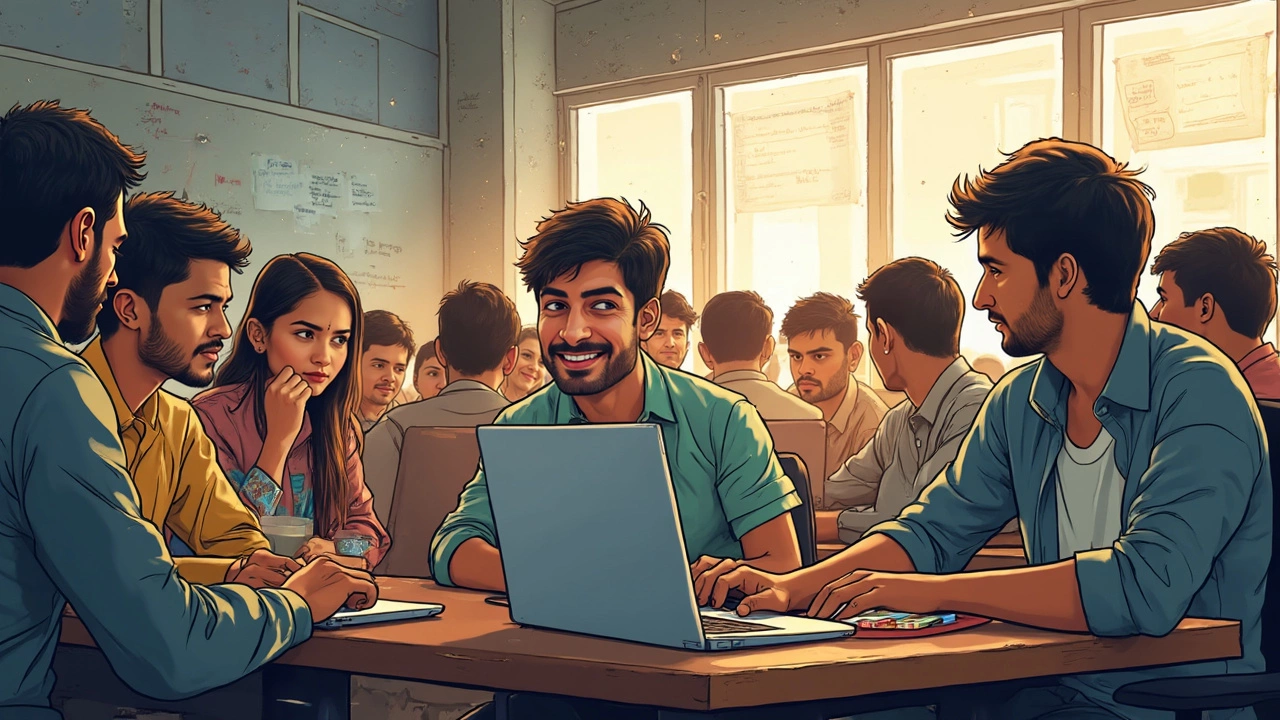Wondering if you can really teach yourself to code? The short answer: Yes, you absolutely can. Plenty of people landed their first dev jobs, built websites, or even launched startups after teaching themselves from scratch. You don’t need fancy degrees or expensive classes—just a device, internet, time, and a big dose of curiosity.
If you’re itching to get started but feel totally lost, you’re not alone. Most new coders don’t know what language to pick or which resources aren’t outdated. The truth? You don’t have to pick the “right” language to start—just pick one with lots of friendly tutorials, like Python or JavaScript. Most people give up because they try to learn too much, too fast, and get overwhelmed by jargon. Keep it simple and don’t be afraid to Google every single question you have. (Yes, even the ones that feel silly.)
Don’t expect to learn everything in a weekend. Coding is a skill, sort of like playing an instrument. The more you tinker and mess around, the better you’ll get. And honestly, some days it’ll feel like you’re making zero progress—totally normal. Stick with it and trust the process.
- Why Self-Taught Coding Is Totally Possible
- What You Really Need to Start
- The Biggest Hurdles (and How to Jump Over Them)
- Tips That Make Coding Click Faster
Why Self-Taught Coding Is Totally Possible
If you’re wondering whether you can teach yourself to code, you’re in good company—some of the world’s most famous developers started out on their own, without a computer science degree. In fact, Stack Overflow’s annual developer survey shows that more than 70% of professional developers partially or fully taught themselves to code. This tells you something: being a self-taught coder isn’t rare. It’s actually pretty normal in the programming world.
The real game-changer in our era is access. You’ve got thousands of totally free online tutorials, coding bootcamps, YouTube channels, interactive coding platforms like Codecademy, and huge communities ready to answer even the most basic questions. Back in the ‘90s, you needed expensive textbooks or college classes to even get started—now, you need a browser and some grit.
- Interactive sites like freeCodeCamp let you practice by actually writing code, not just reading about it.
- YouTube offers step-by-step walkthroughs for everything from beginner learn programming basics to advanced projects.
- Stack Overflow and Reddit are packed with real people willing to explain, debug, and share solutions.
Another cool thing: tech companies care way more about your projects and skills than where you learned them. GitHub is full of folks who landed developer jobs by showing off self-taught side projects. If you can build something useful—even something simple—you’re already ahead of many beginners who never try.
Most importantly, code itself doesn’t care who you are or where you learned it. If it works, it works. That’s why anyone can break into this field, whether you start at 15 or 50, and whether you live in NYC or a small town halfway across the world. You set the pace. You get to build real stuff and show what you can do. That’s the magic of being a self-taught coder.
What You Really Need to Start
If you want to teach yourself to code, don’t assume you need a fancy setup. You can get pretty far with a basic laptop (even a Chromebook will do), a reliable internet connection, and a place to save your code, like your own computer or a cloud service like GitHub.
Here’s what actually matters most when you’re just starting:
- Device: Almost any old laptop or desktop works for learning most beginner languages. If you want to build iPhone apps, you will need a Mac, but for web stuff — any computer that's not from the Stone Age is fine.
- Internet: You need this to grab lessons, watch videos, and hit up forums when you get stuck.
- Free Tools: Most programming is done in free text editors or environments. Examples: Visual Studio Code (for almost anything), PyCharm Community Edition (for Python), or just Notepad++.
- Where to Write Code: Many lessons use online editors like Replit, JSFiddle, or CodePen, so you don’t even have to set up your own computer at first.
When it comes to resources, there are tons of good ones. Here’s a breakdown showing what people actually use:
| Resource Type | Popular Examples | Price |
|---|---|---|
| Interactive Sites | freeCodeCamp, Codecademy | Free/$ |
| Video Tutorials | YouTube (Traversy Media, The Net Ninja) | Free |
| Practice Platforms | LeetCode, HackerRank | Free/$ |
| Reference | MDN Web Docs (for JavaScript), W3Schools | Free |
Last thing—get used to making mistakes. Nobody writes perfect code the first try. Use Google, Stack Overflow, and Reddit’s r/learnprogramming whenever you’re stuck. That’s how real coders roll every single day.

The Biggest Hurdles (and How to Jump Over Them)
If you want to teach yourself to code, you’re going to hit a few walls. That’s just how it goes. But knowing what’s coming makes those walls a lot less scary—and you can plan to jump over them instead of crashing into them.
First up: feeling completely lost at the beginning. When you look up a simple answer and end up buried in jargon, it’s normal to panic. In fact, Stack Overflow’s 2023 Developer Survey found that nearly 70% of new coders struggle most with “not knowing where to start.” Solution? Find one, simple beginner-friendly resource and follow it step by step—don’t hop around a dozen tutorials your first week.
Staying motivated is another beast. Coding sometimes feels like you’re learning how to run by slamming into walls. The fix: set micro-goals (like making a button change color) instead of massive projects (like building an app from scratch). Momentum comes from tiny wins, not big leaps. And if you get stuck, almost every pro coder will tell you—so did they.
“Almost every coder you know started off looking at code and having no idea what was going on.” – Chris Pine, author of Learn to Program
Burnout is real, too. Pushing through late nights and skipping breaks doesn’t actually make learning faster—it just fries your brain. Try short, focused sessions (30-45 minutes) and then take a real break. And don’t forget: asking for help isn’t cheating. There’s a massive online community ready to answer your questions, no matter how basic they seem.
If you find yourself staring at the same error for hours, don’t tough it out alone. Here’s a straightforward plan that works for most new programmers:
- Google your exact error message—chances are, plenty of others have hit the same wall
- If that fails, describe your problem on a site like Stack Overflow (someone probably helps you, fast)
- Switch to a new problem or project for a while—sometimes your brain solves it in the background
Finally, remember that the self-taught path doesn’t mean doing it all by yourself. Use forums, Discord groups, or even coding classes as backup. Real progress mostly comes from refusing to give up, not from knowing all the answers at the start.
Tips That Make Coding Click Faster
If you're aiming to really teach yourself to code, hacks and tactics make a big difference. There are a few moves that help you go from stuck-on-step-one to actually building stuff you care about.
- Build real projects fast. Following coding tutorials is fine, but you'll truly learn when you try making simple apps or web pages on your own. Pick something you’ll actually use—like a grocery list app or a personal site. When you run into roadblocks, searching for solutions will teach you more than just reading the manual.
- Break problems into tiny pieces. Even pro coders get stuck on big problems. When something feels overwhelming, chop your goal into the smallest steps possible. Pseudocode (writing out plain-English instructions before you code) is your best friend here.
- Use spaced repetition for memorizing. Coding means lots of syntax and weird commands. Free tools like Anki or Quizlet help you remember new terms and functions by reviewing them over time. This method is scientifically proven to help stuff stick.
- Google is your secret weapon. Every coder—newbie or pro—Googles errors and questions. Don’t waste hours guessing. Look for answers on sites like Stack Overflow, Reddit, and MDN for web stuff. It’s not cheating, it’s smart.
- Find a community. You’ll turbocharge your progress by joining free online groups. Discord servers, Reddit threads, or Twitter/X communities for your chosen language are easy to find. There’s always someone who’s been where you are and can point you in the right direction.
According to a Stack Overflow 2023 developer survey, over 70% of professional developers say they learned new languages and frameworks on their own, outside traditional classrooms. That’s real proof self-taught isn’t just possible—it’s common now.
You'll make the fastest progress by staying consistent. It’s better to code for 20 minutes every day than to cram for five hours once a week. Celebrate tiny wins, and don’t compare your journey to others. With a sensible mix of project-based learning, asking questions, and plugging into communities, becoming a self-taught coder is more doable than ever.
